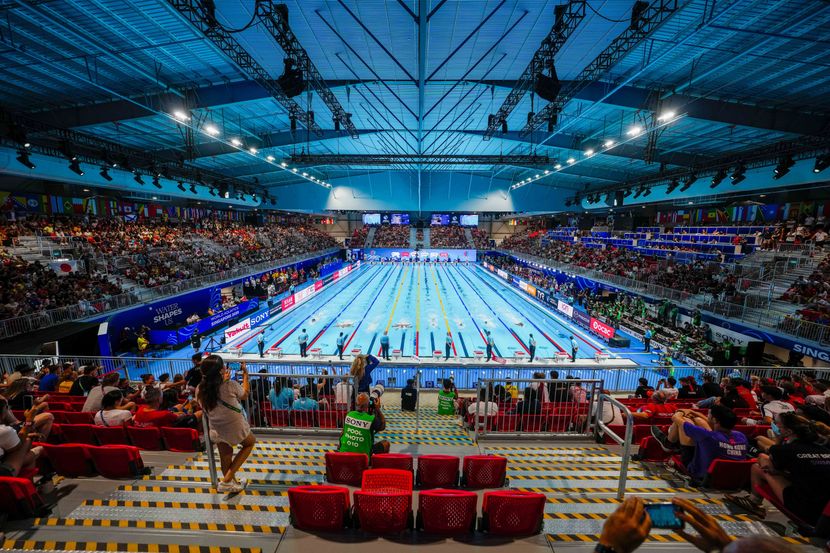
Alongside world-class performances in the water, the World Aquatics Championships – Singapore 2025 played host to an extensive programme of development activities designed to support coaches, athletes and professionals from across the entire aquatics community.
Led by the World Aquatics Development and Athletes’ Services Team, a series of workshops and study sessions took place on site, with a strong focus on athlete wellbeing, coaching leadership, injury prevention and sustainable practices across all aquatic sports.
High Diving: Understanding Injury and Building Strength
Among the main initiatives at this year’s World Aquatics Championships were athlete testing and study sessions throughout the high diving competition, which were explained to coaches during a dedicated workshop. These were led by renowned sport physiotherapist Angela Passenbrunner and elite high diver and World Aquatics athlete ambassador Alain Kohl, in collaboration with Dr Wes O Zimmermann and World Aquatics.
Speaking about the initiative, Angela Passenbrunner commented:
"These sessions, supported by a comprehensive questionnaire, are part of a wider effort to understand the unique physical demands of high diving"
"We’re assessing joint stability, landing mechanics and muscular imbalances — aiming to define safe mobility and strength profiles that support long-term participation in the sport. The ultimate goal is to make high diving safer, enhance athletic performance and help athletes extend their careers at the elite level.”
The project also aimed to develop a standardised test battery that coaches, sports physiotherapists and athletic trainers can use during the season to track mobility, strength and functional readiness.
The feedback provided to athletes was highly individualised. Many gained insights into their own physical profiles, including potential imbalances or risks.
“It’s about increasing awareness; knowing how to train smarter to prevent injuries before they occur.” Passenbrunner adds.
Common injuries observed include:
- Overuse injuries (lumbar spine, knees, shoulders)
- Impact-related trauma (neck, knees, adductors)
To help reduce these risks, athletes were advised to focus on:
- Strengthening key areas: neck, lumbar spine, knees, pelvis
- Mobility work for the thoracic spine, hips, and quadriceps
- Monitoring training loads, particularly dive volume
- Creating structured recovery plans
Water Polo and Swimming: Sustainable Coaching in Focus
Coaching development also took centre stage with a workshop titled “Leading Yourself First – Building a Sustainable Coaching Career”, led by Olympic swimming coach James Gibson. Panellists included Angie Winstanley-Smith, Head Coach of New Zealand’s women’s water polo team, and Matt Scoggin, Head Coach of Diving at the University of Texas.
The session explored what sustainable coaching looks like — not only staying in the profession long-term, but also leading with empathy and adapting to different cultural and personal backgrounds.
The conversation addressed social media’s growing role in sport. While platforms can empower athletes and help them generate income, concerns were raised about overexposure, especially during competition periods. The discussion emphasised the importance of controlled access and athlete protection.
Rest, recovery and the mental wellbeing of both athletes and coaches were highlighted as key elements of a sustainable high-performance environment.
Plant Power: Exploring Nutrition Across Disciplines
Multi-discipline nutrition sessions, “Plant Power: Fuelling Performance with Plant-Based Proteins”, were held for both athletes and coaches. The sessions were led by sports nutritionist Olivia Wong, alongside Dr Riham Safwat and four-time world champion artistic swimmer Giorgio Minisini, with sessions for swimmers supported by World Aquatics Athletes’ Committee members Jamila Lunkuse and Jessica Hansen.
The workshop examined:
- Benefits of plant-based proteins (including antioxidants, fibre, and cardiovascular health)
- Common challenges such as lower essential amino acid content and reduced absorption
- Practical solutions, including food preparation methods like soaking and sprouting
- How to meet protein targets for performance
When speaking to World Aquatics on site at one of the sessions, Giorgio Minisini stated:
"Leading by example always works better than words. When teammates see the benefits of plant proteins, they become curious and start asking questions"
Olivia Wong added:
“It’s not about cutting out animal products entirely. We’re seeing a broader shift — more athletes are interested in plant proteins. But it’s important they get tailored advice from a sports dietitian to make informed choices that are right for them.”
World Aquatics Athletes’ Lounges
Dedicated Athletes’ Lounges were available across all venues at the World Aquatics Championships – Singapore 2025, offering a relaxing and inclusive space for athletes to unwind and meet fellow athletes from around the world.
The Athletes’ Lounges included an array of interactive activities and entertainment. World Aquatics Athletes’ Committee members Jamila Lunkuse and Jessica Hansen made frequent visits to connect with athletes from around the world across all six disciplines, support the World Aquatics Refugee Team and conduct surveys with athletes.
National Federation meetings
The World Aquatics Championships also featured workshops for Continental Organisations, alongside meetings with National Federations to discuss their priorities, key achievements and plans for the future. This underlines World Aquatics’ commitment to maintaining an open dialogue withs its members from all regions.
Looking Ahead
The development and athletes’ services activities at the World Aquatics Championships – Singapore 2025 reflect a broader commitment by World Aquatics to support athletes, coaches, national federations and medical staff.
With sessions rooted in real-world practice and expert insight, the on-site programme helped to strengthen the global aquatics community, both in and out of competition.